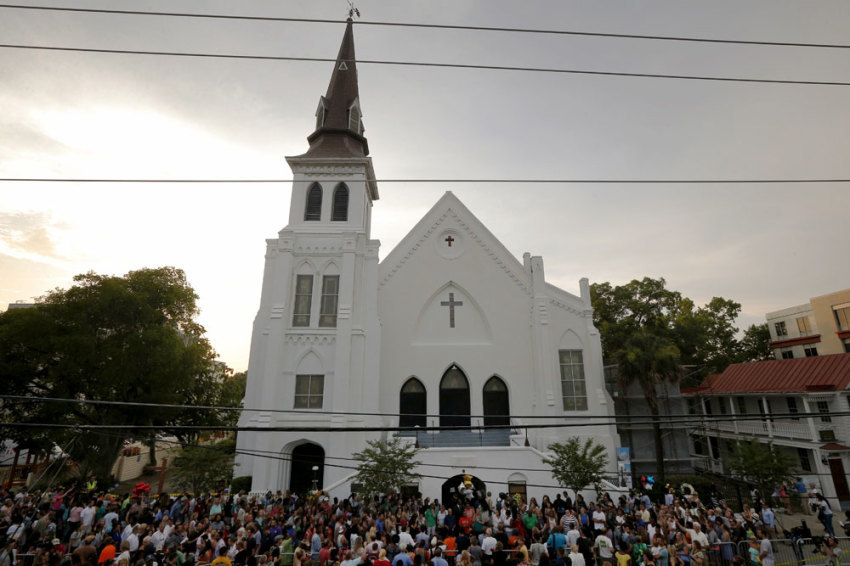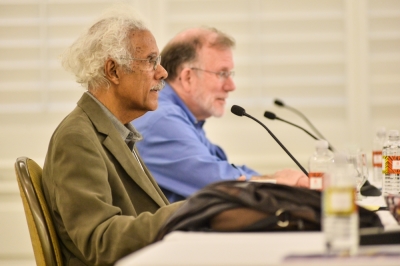Dylann Roof, the Black Church and 'The Love That Forgives'

MIAMI BEACH — How could members of a black church forgive the man who murdered nine of their brethren? Historian Albert J. Raboteau explained the rich tradition of forgiveness within the African-American church experience at last month's Faith Angle Forum.
On June 17, Dylann Roof shot and killed the pastor and eight other members of Emanuel African Methodist Episcopal Church in Charleston. After the tragedy, the nation watched with wonder as family members of those slain spoke to Roof at a bond hearing, calling him to repentance and forgiving him.
"I forgive you," the emotional daughter of Ethel Lance, 70, one of the victims, told Roof. "You took something really precious from me. I will never talk to her ever again. I will never be able to hold her ever again, but I forgive you!"

Raboteau, Henry W. Putnam Professor Emeritus of Religion at Princeton University, looked at this history of forgiveness in the black church through the lives of six figures: Fannie Lou Hamer, Annelle Ponder, Martin Luther King Jr., Francis Grimke, Mary Younger, Solomon Bayley and William Grimes; and concluded with a personal story about the murder of his father by a white man in Mississippi.
Due to slavery, Raboteau explained, two different versions of Christianity developed in the United States: that of the slave owners and that of the slaves. Black Christians developed "an alternative religious narrative" to that of white slave-owning Christians and their supporters that contradicted "the dominant national myth of America as God's New Israel or alternately as the Redeemer Nation."
Where the dominant national myth saw the United States as the "new Israel," slave Christians saw a better metaphor in Egypt during the time of Jewish captivity.
"While generations of white American preachers and politicians spoke of America ... as a New Israel, the Promised Land. African-Americans maintained that on the contrary this nation was the Old Egypt, 'Go Down Moses and Tell Old Pharaoh to Let My People Go' and would remain so until all of God's children were free," Raboteau said.
These were not minor theological differences, Raboteau continued, but went to the core meaning of the Gospel.
These African-American Christians "developed a radical criticism of the cultic piety of American exceptionalism," he said. "In their narrative Christianity and slavery were incompatible."
America had two gospels.
"This conflict between two versions of Christianity, one that accommodated slavery and the other which did not affected more than legal status. It bifurcated the meaning of the Christian Gospel," he said.
William Grimes was a former slave. In forgiving his master, he identified with his Savior.
Recalling a time that his master accused him of a crime he did not commit, Grimes said in 1855, according to Raboteau, "When I considered him accusing me of stealing, when I was so innocent, and had endeavored to make him satisfied by every means in my power, that I was so, but he still persisted in disbelieving me, I then said to myself, if this thing is done in a green tree what must be done in a dry? I forgave my master in my own heart for all this, and prayed to God to forgive him and turn his heart."
Grimes was referencing Luke 23:31, "For if they do these things in a green tree, what shall be done in the dry?" and identifying with the suffering Savior.
"This allusion reveals that it was from his morally superior vantage point that Grimes was able to forgive his master, who lived under threat as he saw it of devastating punishment," Raboteau explained.
"Simply put, Grimes' view of himself, what it meant for him to forgive his master creates a moral leverage or an act of moral jujitsu if you will, which elevates him over his master.
"In short, if Jesus came as the suffering servant, who resembled him more, the master or the slave?"
Similarly, Solomon Bayley struggled to forgive the man who sought to sell his wife and daughter even as they attended the same Methodist meeting.
"This was a cause of wrestling in my mind but that scripture abode with me, 'He that loveth father or mother, wife or children, more than me, is not worthy of me' then I saw it became me to hate the sin with all my heart, but still the sinner love; but I should have fainted, if I had not looked to Jesus, the author of my faith," Bayley said.
Raboteau believes Bayley's ability to imitate Christ in that circumstance is tied to the intense suffering he was forced to endure.
"The attitude which Bayley struggled to achieve in imitation of Jesus seems incredible unless one perceives it as a way of holding onto meaning in the midst of the absurdity of unchecked white supremacy at its worst," he said.



























